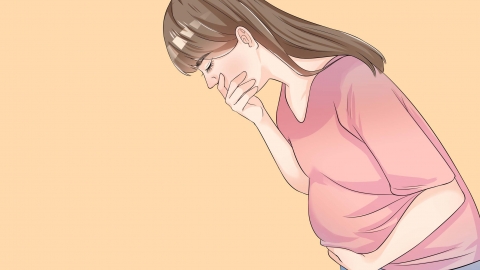What causes the reappearance of morning sickness at seven months of pregnancy?
Nausea and vomiting at seven months of pregnancy may be caused by hormonal fluctuations, improper diet, intrahepatic cholestasis of pregnancy, acute gastroenteritis, or gastroesophageal reflux. Symptoms can be improved through dietary adjustments, regular作息, and medication. Seek medical attention promptly if vomiting is severe or accompanied by abdominal pain or jaundice.
1. Hormonal fluctuations: Minor hormonal changes in the second or third trimester can irritate the gastrointestinal mucosa, leading to nausea and vomiting, typically occurring intermittently. It is recommended to eat small, frequent meals, avoid an empty stomach, and choose light, easily digestible foods to reduce gastrointestinal irritation.
2. Improper diet: Overeating or consuming greasy, spicy foods increases the burden on the gastrointestinal tract and may trigger vomiting, possibly accompanied by bloating and discomfort. It is advised to control portion sizes, avoid irritating foods, consume more fresh fruits and vegetables, and take a light walk after meals.

3. Intrahepatic cholestasis of pregnancy: Abnormal bile metabolism during pregnancy leads to bile accumulation, which irritates the gastrointestinal tract and causes nausea and vomiting, often accompanied by skin itching and jaundice. Under medical guidance, medications such as ursodeoxycholic acid capsules, ademetionine disulfate tosylate enteric-coated tablets, and vitamin B6 tablets may be used to relieve symptoms.
4. Acute gastroenteritis: Bacterial or viral infections due to contaminated food cause inflammation of the gastrointestinal mucosa, resulting in vomiting along with diarrhea and abdominal pain. Under medical guidance, medications such as montmorillonite powder, oral rehydration salts III, and lactasin tablets may be used to improve symptoms.
5. Gastroesophageal reflux: Enlargement of the uterus compresses the stomach, causing gastric contents to reflux into the esophagus and triggering nausea and vomiting, often accompanied by a burning sensation behind the breastbone. Follow medical advice to use medications such as hydrotalcite chewable tablets, omeprazole enteric-coated capsules, and domperidone tablets to alleviate symptoms.
Maintain a regular sleep schedule and avoid staying up late. Eat light, easily digestible meals, have small frequent meals, engage in mild physical activity after eating, stay in a positive mood, and drink plenty of water to stay hydrated—these measures help ensure a more comfortable pregnancy.








